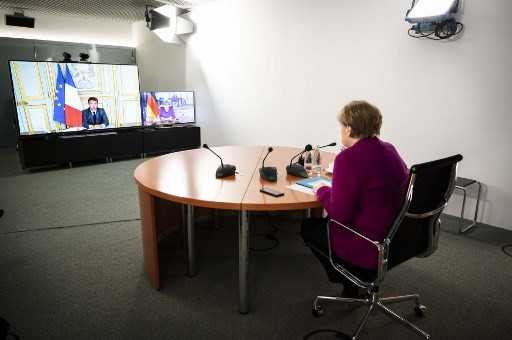Macron, Merkel agree 500 billion euro EU virus recovery plan
19 May, 2020

France and Germany proposed Monday a 500 billion euro ($542 billion) fund to finance the recovery of the European Union's economy from the devastation wrought by the coronavirus crisis.
Putting aside past variations and wanting to prove that the Franco-German core of Europe remains intact, President Emmanuel Macron and Chancellor Angela Merkel announced the unprecedented package after talks by video conference.
With the European economy facing its biggest challenge since World War II, Macron also acknowledged that the EU had fallen short in its initial response to the virus and had a need to coordinate more closely on health.
Financed by "borrowing from the marketplace in the name of the EU," the amount of money will flow to the "worst-hit sectors and regions" in the 27-member bloc, both countries said in a joint statement.
"We think that it isn't only fair but also essential to now provide the funds... that we will then little by little repay through several future European budgets," Merkel said.
Countries profiting from the financing wouldn't normally have to repay the amount of money, Macron added, emphasizing that the funds "weren't loans."
'More solidarity'
The borrowing marks a major shift by Germany, which has until now rebuffed calls by Spain and Italy for so-called "coronabonds" for joint borrowing on financial markets to supply stimulus cash.
Germany, holland and other rich countries had seen them as an effort by the indebted south to unfairly take benefit of the north's fiscal discipline.
But Merkel said the seriousness of the crisis meant that "solidarity" should be the order of the day.
"The goal is to make sure that Europe comes out of the crisis more cohesive and with an increase of solidarity," she said, calling the proposal "courageous."
European Commission chief Ursula von der Leyen, who need to help implement the package, hailed the program as a "constructive proposal."
"It acknowledges the scope and how big is the economical challenge that Europe faces," she said.
European sources told AFP the other day the Commission would lay out its plan toward the end of May, hoping both to reconcile the opposing objectives while proving that European solidarity is a lot more than just a lofty slogan.
'Learn the lessons'
Macron said stronger European coordination on medical issues must be important, admitting that the EU fell short in its initial response to the coronavirus outbreak.
"Europe was without doubt put at fault at the start of this crisis," Macron said.
He added that unilateral steps by some EU countries to close borders -- without consulting their neighbors -- had given a "sad image" of Europe.
He said Europe needed "very concrete capacities" to handle health crises with shared stocks of masks and tests, and prevention plans to combat epidemics.
"A Europe of health -- which includes never existed -- should be our priority," he said. "We need to learn all of the lessons out of this pandemic."
In a sign of the way the pandemic has changed global diplomacy, their joint press conference saw them stand at lecterns in cities a huge selection of kilometers apart, with Merkel in Berlin and Macron in Paris.
Europe is just starting to emerge from the lockdowns to prevent the outbreak, which includes taken an enormous bite out of national economies and raised the prospects of damaging recessions that could last for months or even longer.
But despite widespread recognition that the hardest-hit countries will struggle to repair the monetary damage by themselves, divisions among EU members how to craft a standard response have hampered comprehensive action so far.
The eurozone economy overall is forecast to contract a whopping 7.7 percent this year, but the damage could possibly be worse in Italy and Greece, that could see their economies shrink by nearly ten percent, prompting a cascade of bankruptcies and job losses.
The European Central Bank has also promised to do "whatever is essential" to greatly help weather the crisis, including a 750-billion-euro scheme to get government bonds for cash-strapped nations.
But that project can be proving problematic after Germany's Constitutional Court attacked it, potentially limiting Germany's participation.
Source: www.thejakartapost.com
